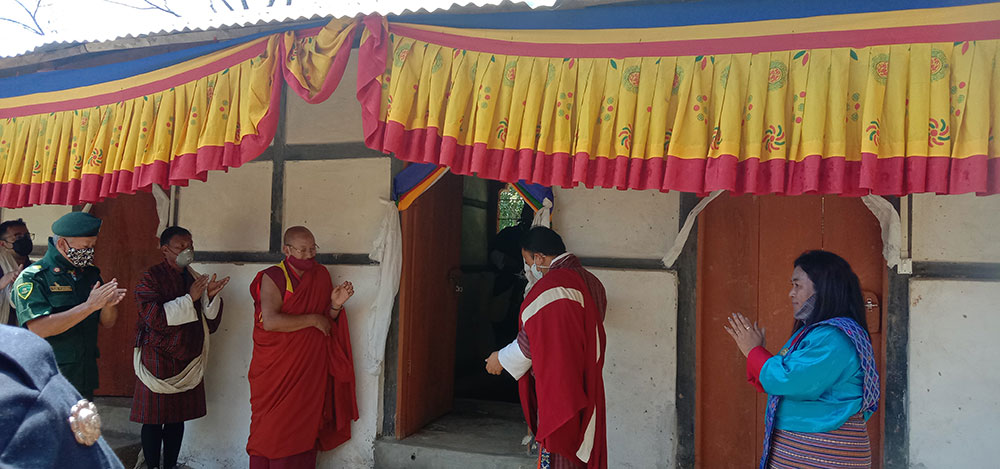Choki Wangmo | Dagana
With the inauguration of a hotstone bath facility on September 5, members of Tashi Dargay Community Forest (CF) in Pangserpo, Dagana, are hoping that they would generate some income.
The hotstone bath facility is at Tashi Dargay menchu (a medicinal water), which is a 10-minute drive from the Drujeygang gewog centre. It falls within the CF and is run by the community on a benefit-sharing basis.
The CF’s chairperson, Sangay Choden, leased the menchu for five years. As a fee, she has to annually pay Nu 20,000 to the CF.
A one-storey structure has four rooms, one for office and three fitted with wooden bathtubs for hot stone bath with attached washrooms.
World Wildlife Fund Bhutan (WWF) helped with materials and wages for skilled labour. CF members contributed labour and local materials.
Water from the menchu is piped to two 1,000 litres of water tanks which is joined to the 1,000 litres boiler, heated using firewood, which is further connected to the bathtubs.
Members of the CF can avail the services at a reduced rate of Nu 300 for two hours. Non-members have to pay Nu 500 for the same time. For a day, the members have to pay Nu 1,600; others have to pay Nu 3,000.
Sangay Choden said that with the income from the hotstone bath services, the CF would be further developed through activities such as sapling development which would be replanted within the CF. “The income would also help us provide loan to needy members at a lower interest rate.’”
She said that the menchu site is accessible to people since it is connected with Drujeygang-Khebisa feeder road.
The menchu is popularly known to cure throat problems, arthritis, gastritis, heart ailments, and eye problems.
An elder resident of Pangserpo said that in the past, there were two menchus, believed to be male and female, but the female menchu was damaged during road construction.
Nguntimo, 83, from Pangserpo said that she stores menchu in water bottles and apply it when she had pain in her knees. “With the facilities developed, I hope to soak myself in the medicine.”
Dagana Dzongdag, Duba, who inaugurated the facility, focused on the importance of record-keeping among CF members and future expansion plans if the visitors increase.
He said that such local interventions were means to improve livelihood within the communities.
Deputy chief of social forestry and enforcement division (SFED), Tashi Wangchuk, said that CF is not only about trees alone but also about the harvest and utilisation of other forest resources within the communities. “Drujeygang gewog has ecologically valuable trees but no economically viable trees to earn income from. Menchu comes as an alternative source of income.”
Since the establishment of first CF in 1997 in Drametse, he said that CF has been flourishing well in the country.
Currently, there are 833 CFs across the country. Of the 32 CFs in Dagana, four are in Drujeygang.
WWF, through the community-based forest resources management (CBFRM) for an improved livelihood project, has invested more than Nu 900,000 in menchu site development.
According to WWF’s project officer, Kuenley Tenzin, the project effectively contributes to sustainable management of forest through improved participatory forest management and community livelihood by increasing their income. “The programme supports 100 CBFRMs in five dzongkhags and has helped expand SFED’s work with CBFRM outside these five dzongkhags.”
Established in 2013, Tashi Dargay CF covers 150.82 hectares of land with 54 members.


